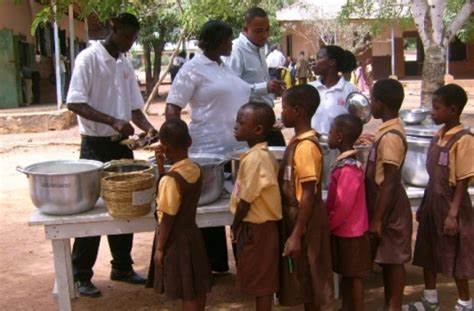The Ghana School Feeding Programme (GSFP), a government initiative aimed at providing nutritious meals to schoolchildren, has recently been under scrutiny due to concerns about the quality and quantity of food served. Naa Humu Boateng, a caterer under the program, has challenged the narrative surrounding the alleged tastelessness of the meals. She asserts that the primary issue lies not in the flavor or nutritional value but rather in the insufficient quantity provided, a direct consequence of inadequate funding. Boateng emphasizes that the meals incorporate protein sources like beans and include vegetables, adding nutritional value to the rice-based dishes. She herself consumes the meals, further reinforcing her claim that the food is palatable. The core problem, she argues, is the financial constraint imposed by the meager stipend allocated per child.
The caterer’s insights shed light on the financial struggles faced by those tasked with preparing meals for hundreds of children. The allocation per child, initially set at 97 pesewas, was later increased to 1 cedi 45 pesewas. While a further increment to 2 Ghana cedis has been announced, caterers like Boateng are yet to receive the revised amount. This financial inadequacy severely restricts the quantity of food that can be prepared. As an illustration, using a budget of 400 to 500 Ghana cedis to feed approximately 350 children significantly limits the portion sizes, leading to complaints about insufficient food. Boateng maintains that the quality of the food remains acceptable; the small portions are the real issue, not the taste.
This debate about the quality and quantity of meals provided under the GSFP comes amidst a major restructuring of the program. The government recently announced the termination of contracts with all existing caterers, effective immediately. This sweeping decision, announced in an official statement on May 2, 2025, bars current caterers from providing meals for the third term of the 2024/2025 academic year. This drastic measure suggests a potential overhaul of the program’s operations, likely aimed at addressing the very issues raised by caterers like Boateng. The termination of existing contracts signals a potential shift in the management and execution of the GSFP, perhaps paving the way for new caterers, revised budgetary allocations, and improved meal provision.
The government’s decision to terminate existing catering contracts adds another layer of complexity to the ongoing discussion about the GSFP. While the reasons for the termination haven’t been explicitly stated in the announcement, it is plausible that the government is seeking to address the concerns raised regarding the quality and quantity of meals. This move could be an attempt to introduce new caterers with potentially better resource management strategies or to implement stricter quality control measures. It also raises questions about the future of caterers like Naa Humu Boateng and how the transition to new providers will be managed to ensure continued meal provision for schoolchildren.
The situation surrounding the GSFP highlights the challenges inherent in implementing large-scale social programs. Balancing budgetary constraints with the need to provide adequate and nutritious meals is a complex undertaking. The concerns raised by caterers underscore the importance of adequate funding and realistic per-child allocations. The program’s success hinges on a sustainable financial model that enables caterers to procure sufficient quantities of quality ingredients without compromising the nutritional value or palatability of the meals. The government’s decision to terminate existing contracts indicates a recognition of the need for change within the program, though the long-term impact remains to be seen.
Moving forward, the GSFP requires a comprehensive review that addresses not only the financial aspects but also the logistical and operational challenges. This includes establishing clear quality control mechanisms, ensuring transparent procurement processes, and providing adequate training and support to caterers. The program’s ultimate goal – providing nutritious meals to schoolchildren – requires a collaborative effort involving the government, caterers, schools, and communities. Open communication, ongoing monitoring, and continuous improvement are crucial to ensure the GSFP’s long-term sustainability and effectiveness in fulfilling its mandate. The success of the program relies on addressing the current challenges and implementing sustainable solutions that prioritize the nutritional needs of Ghana’s children.














